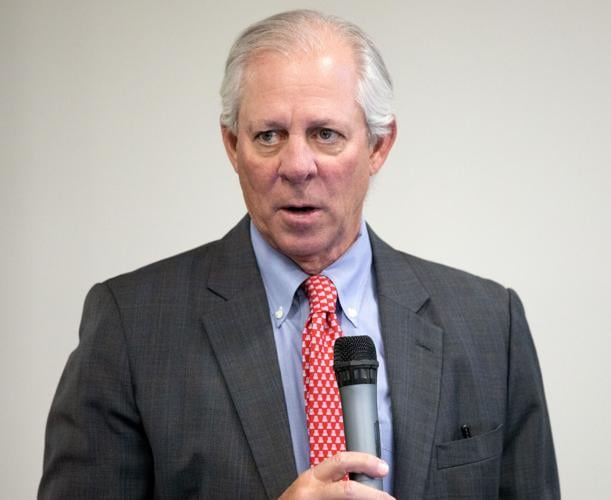University of Arizona President Robert C. Robbins announced that his CFO is out of her nearly $500,000-a-year job and that the UA will conclude strategic initiatives funding, enact hiring and compensation freezes and reduce financial aid for out-of-state students — among other steps — as it deals with "an ongoing budget deficit."
"I accepted the resignation" of UA Vice President of Business Affairs and Chief Financial Officer Lisa Rulney earlier Wednesday, Robbins announced Wednesday night at a special meeting of the Arizona Board of Regents.

Rulney
ABOR Executive Director John Arnold, who was budget director for former Gov. Jan Brewer, will serve as UA's interim vice president of business affairs and CFO for the next few months. Arnold won't inherit Rulney's nearly half-million-dollar salary on top of his compensation from ABOR, according to a board member. Rulney had held the UA post since April 2019.
Robbins' plan, presented to the regents Wednesday night, also includes immediately freezing international travel for senior administrators, restricting university purchasing and deferring nonessential capital projects, and eliminating the tuition guarantee for all new students starting in fall 2025 but not for students already enrolled.
"I promised all of you that I would dig in and I've dug in, and I don't like everything that I've discovered," said Robbins, who himself makes about $1 million per year in base salary.
His plan was required after he and Rulney told the board on Nov. 2 that the university had a predicted 97 days worth of cash on hand for the end of fiscal year 2024 if they continued the spend at their (then) current rate of spending. Rulney forecasted 156 days cash on hand for the end of fiscal year 2023, which ended in June, but in reality, the university ended up closing out the year with just 110. The senior administrators blamed a failure of their prediction model that caused a $240 million miscalculation.
Asked by a faculty member at a Dec. 4 Faculty Senate meeting why she hadn't resigned, Rulney defended her decision to stay, saying she took "responsibility for overestimating our days cash on hand ratio," but said she would "continue to work on this challenge until the president asks me not to, because I believe in this place, and I am excited about our future."
ABOR Chair Fred DuVal said the UA's cash reserves problem turned out to be a symptom of an ongoing budget deficit at the university as well as problems with financial and reporting structures. He also stated it was the fault of the board for not identifying the problem sooner.
"Today we intend to take the first steps to turn the ship around at the University of Arizona and to assure our campuses, and the public, that this will not happen again in Tucson or at any of our state's universities," DuVal said at the Wednesday night meeting.
Other plans
In his opening remarks, Robbins, a former cardiac surgeon, compared the financial issues facing the UA to a disease.
"The action steps I'm presenting today attack the disease," he said. "These steps will not lead to an immediate increase in cash, but we'll address the problems causing the decreases in cash."
Robbins said the financial issues the UA has run into were driven primarily by two problems. He said the university has "an ongoing budget deficit, meaning we are spending more than we are making," but added that "we do not know the full scope of this issue yet."
The second problem, he said, is a "decentralized budgeting allocation process and administrative structure that has led to the poor budget controls and ineffective administrative structure and overspending in some of our budget units."
Immediately, the university has implemented a hiring and compensation freeze, has frozen international travel for senior administrators, restricted purchases, deferred nonessential capital projects and concluded strategic initiatives funding. He did say whether there would be layoffs.
The hiring freeze, which will impact the entire university, should affect the 618 open positions, which include staff, research and teaching positions, currently on the UA website.
In a previous Faculty Senate meeting, Robbins said layoffs would be up to individual units to decide on as they deal with budget cuts.
According to a letter he sent out to the UA community Wednesday night, the hiring and compensation freeze will save the university $16 million, the immediate purchasing restrictions will save $5 million and deferring non-essential capital projects should save $9 million.

UA President Robert C. Robbins
Robbins told the board that in the next 18 months, the university will:
1) Implement a fiscal year 2025 base budget reduction with focus on units spending in deficit, overhead and administrative functions.
2) Delay the fiscal year 2025 salary increase program.
3) Conduct individual reviews of all budget units in an effort to ensure ongoing financial accountability.
4) Rebalance undergraduate out-of-state merit aid for new students.
5) Eliminate the university's tuition guarantee in fall 2025 for all new students.
6) Eliminate the Activity Informed Budgeting (AIB) budgeting model and move towards a centralized planning model.
7) Reorganize administrative services in Information Technology, Human Relations, Communications & Marketing, Business & Finance and University Advancement.
"This work will take some time, but it will begin immediately," Robbins said.
Additionally, Robbins committed to not reducing need-based aid for Arizona resident students, not reducing need or merit-based aid or eliminating the tuition guarantee for all current or accepted students, not instituting furloughs or reducing retirement benefits and not jeopardizing the university's teaching and research mission. He also stated the university will no longer permit overspending of budgets.
"We made promises to our students, and we will keep those promises," he said.
Athletics
In a Faculty Senate meeting earlier this month, Robbins stated that layoffs in the athletics department were "100%" happening. He seemed to backtrack in Wednesday's presentation.
"I believe that athletics is a core part of the University of Arizona and a key element to our long-term success," he said. "I have had many great meetings with the athletics department, and we're committed to putting together a multi-year plan in place to bring their budget into balance."
In that same Faculty Senate meeting, Robbins said the UA loaned the athletics department $86 million from the university's funds in recent years.
The new plan, he said Wednesday, will include "a review of ticket pricing opportunities" and ways to "maximize media rights and philanthropy, and consolidating administrative functions within the university."
Robbins told the regents he "regrets" that the investments made within his strategic plan have gotten tied up with the financial issues at the university.
"I firmly believe in the principles we've put in place," he said. "These initiatives have greatly advanced the lives of students and their success, as well as our research mission."
Regents' reactions
Robbins' presentation was met with enthusiasm by the regents.
"The remedies that you're proposing seem designed to really right the ship without doing harm to the core mission of the university," Regents Chair DuVal said. "They're meaningful, scaled, but appropriately aggressive."
Regent Larry Penley added he was "encouraged" by Robbins' remarks.
"It is apparent that you're taking action and making the essential decisions, the immediate changes, that must be made," Penley said. He added later that "I know you'll be thoughtful about the strategic impacts as you make these decisions."
ABOR adopts new rules
As previously reported, ABOR announced its own proposal Tuesday to change the way the board, as well as the state's three public universities, operate financially.
The unanimous board formally approved those plans Wednesday night.
The new plan includes creating two additional financial reports that must be completed by Arizona State University, Northern Arizona University and the UA. There will now be a monthly operating cash report to identify trends in spending, and a mid-year financial update to compare current revenue and expenditures to historical numbers, among other changes.
Arnold told the regents that some of the changes can be enacted by spring 2024, with most others expected to be implemented within the next 12 months.
University of Arizona President Robert Robbins gives a financial update: Dec 13





